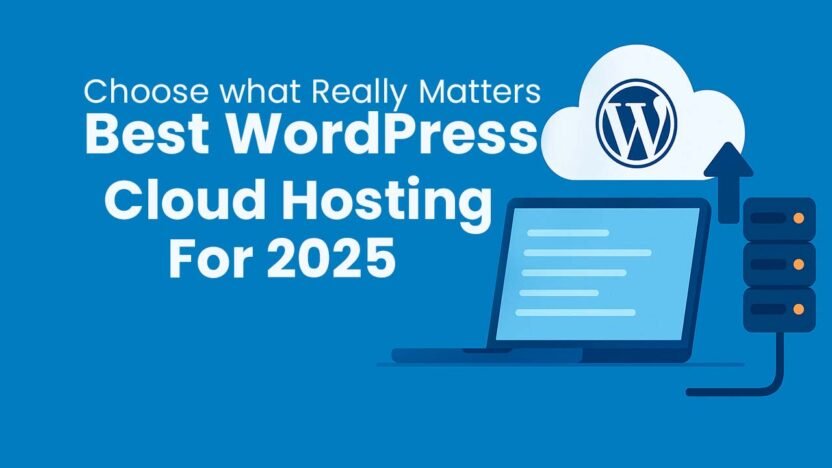Introduction to My Hosting Journey
Hello friends! My name is Ghulam Muhiudeen. For the last 5 years, I have become quite deep in the world of blogging. I have built my own website “ShortlPak Blogging” from scratch.
During this time, I have migrated so many WordPress websites that I do not remember the count, and also fought with 500 internal server errors at 3 in the night. And when “unlimited” is written on shared hosting and suddenly a storm of traffic comes, then the real face comes in front. It is not a good experience at all.
This whole hosting journey taught me an important lesson — not all hosting is the same, especially when it comes to speed, reliability and mental peace. This is why I have become crazy about cloud hosting. I spent a lot of time testing, benchmarking and frustration but now I am ready to give a simple and straightforward guide – best WordPress cloud hosting for 2025.
How to Start a Fashion E-Commerce Store on a Low Budget
Why Cloudways is the Best Overall Choice
According to me the best overall cloud hosting for 2025 is Cloudways. Why? Because it gives the perfect combo of performance, flexibility and affordability. You get extremely powerful cloud servers without any rocket science, i.e. you don’t even need a server management degree.
So let’s talk about the best WordPress cloud hosting options for 2025, which I have personally tested – so that you don’t waste your money.
1. Cloudways: Most Flexible and Best Overall
First on the list is Cloudways – it is the most flexible and the best overall. Its model is of a different level. They do not have their own servers, they offer a simple and easy platform above top providers like Google Cloud, AWS, and DigitalOcean. This means you get power and no tension. You get super-fast SSD hosting, caching tools are also powerful, and tasks like setup, security and backup are done in one-click. Easy for beginners and full control for developers.
Pros:
- 5 top cloud providers have options
- Pay-as-you-go billing, meaning you get as much money as you use
- Speed and security are both best
- Unlimited websites on any plan
Cons:
- Domain and email options are not included
- Best for those who want power — developers, agencies, or tech-savvy users.
2. Kinsta: Best for Performance and High-Traffic Websites
Then comes Kinsta, which is best for performance and high-traffic websites. It runs only on Google Cloud’s top servers and focuses on speed and security from every angle. Edge caching makes the site load lightning fast, daily backups are available, and the dashboard is super easy. It is a bit expensive, but performance is worth the money.
Pros:
- Google’s C2 and C3D runs on fast machines
- 24/7 WordPress expert support
- Free migration and 99.9% uptime
Cons:
- Expensive
- Some plugins are not allowed
- Best for those who have high-traffic website or e-commerce.
3. WP Engine: Best for Agencies and Developers
Third is WP Engine – This is best for agencies and developers. More than 1.5 million websites are running on their platform. This is a full developer package with tools like EverCache, one-click staging, and auto updates.
Pros:
- Easily handles high traffic
- Best tools and features for developers
- 24/7 expert support
Cons:
- Expensive
- Email and domain registration not included
- Best for digital agencies and professional developers.
4. SiteGround: Perfect for Beginners and Small Businesses
The fourth option is SiteGround – perfect for beginners and small businesses. It is based on Google Cloud and is officially recommended by WordPress.org. Dashboard is easy, daily backups are free, and support is available 24/7.
Pros:
- Affordable plans with good speed
- Free CDN, SSL, daily backups
- Support team is helpful
Cons:
- Renewal price is high
- Storage can be a little limited
- Best for those who are just starting out or run a small business.
5. Hostinger: Budget-Friendly Cloud Hosting
5th is Hostinger – famous for budget-friendly cloud hosting. hPanel interface is easy, free domain is available, LiteSpeed caching is also included. Best option for beginners.
Pros:
- Quite cheap starting price
- Easy setup and user-friendly panel
- Free domain, SSL, and AI tools also included
Cons:
- Performance can dip on high traffic
- Sometimes support is a bit slow
- Best for bloggers, students, and people with tight budget.
6. Liquid Web: High Performance and VPS-Level Solutions
Next is Liquid Web – If you want high performance and VPS level custom solution then this is the best. Their support is known as “Heroic Support” and they promise 100% uptime.
Pros:
- Performance and support both top-level
- Managed security and backups
Cons:
- Quite expensive
- Can be a bit complex for beginners
- Best for those who don’t want any downtime on their site.
7. DreamHost: Value for Money
The other option is DreamHost – it is also recommended by WordPress.org and offers value for money. Their cloud plan called DreamPress is quite reliable. You get unlimited traffic, caching and backups, and a free domain.
Pros:
- Affordable and 100% uptime guarantee
- Free domain and SSL
Cons:
- Server locations are limited
- Support is a little basic level
- Best for beginners and bloggers who want an all-in-one package.
8. Amazon AWS: For Advanced Users
Or Amazon AWS – This is for advanced users who want to manage their own servers. Maximum control is available, but it is not easy to use.
Pros:
- Full flexibility and scalability
- Enterprise-grade security
Cons:
- Technical knowledge is required
- Built-in tools are not available for WordPress
- Best for large businesses or developers who want to customize the entire server.
9. Google Cloud: High-Speed Option for Developers
The new option is Google Cloud – similar to AWS, but it runs on Google’s network. Speed, uptime and security are all top-notch. DDoS protection is also included.
Pros:
- High speed and security
- Fast delivery from global network
Cons:
- Technical knowledge is a must
- WordPress management tools are not available
- Best for large-scale projects and developers.
10. Pressable: Optimized for WordPress and WooCommerce
Last but not least, Pressable – This is a product of Automattic (parent company of WordPress.com). It is specially optimized for WordPress and WooCommerce. Performance is smooth and traffic spikes are also easily handled.
Pros:
- Fully optimized for WordPress
- Perfect for WooCommerce
- Auto-scaling enabled
Cons:
- Expensive
- Server control limited
- Best for those who want a hands-free experience and want to focus only on their content.
Managed vs. Unmanaged Cloud Hosting
Whatever you need, you will find a solution for every level in this list – be it a beginner or a pro developer. Deciding between managed and unmanaged cloud hosting is like deciding whether you will hire a chauffeur or assemble your own car.
Managed Hosting: Hassle-Free Experience
Managed hosting means the hosting company will handle everything – security, updates, backups, speed optimization – all will be their headache. You just focus on your content and business. This is the perfect option for beginners, business owners, or people who want to stay away from technical things.
Unmanaged Hosting: Full Control for Experts
In unmanaged hosting, you only get the keys to the server, and you have to do everything yourself – from setup to security and maintenance. You get full control here, but it requires both technical knowledge and time. This is best for developers or IT teams who want a custom setup.
Frequently Asked Questions (FAQs)
1. Which is the fastest cloud hosting for WordPress?
Kinsta and WP Engine are the fastest options, as they use premium infrastructure like Google Cloud C2 machines and advanced caching.
2. Is cloud hosting right for beginners?
Absolutely, especially if it’s managed cloud hosting. Providers like SiteGround, Hostinger and Cloudways offer beginner-friendly dashboards and take care of the technical stuff themselves.
3. How much does WordPress cloud hosting cost?
Pricing varies. Budget options like Hostinger start at ₹10/month. Mid-range options like SiteGround and Cloudways range from ₹30–₹50/month. Premium options like Kinsta and WP Engine start from ₹25–₹35/month and can go up.
4. Do you get a free domain with cloud hosting?
Some hosting companies like Hostinger and DreamHost offer a free domain for the first year. But premium managed hosting plans usually don’t include this.
Conclusion: Choose the Right Hosting for Your Needs
If you want a simple and hassle-free experience, go for managed hosting. If you want full control and custom setup, and you can manage the technical things, then unmanaged hosting is best.





